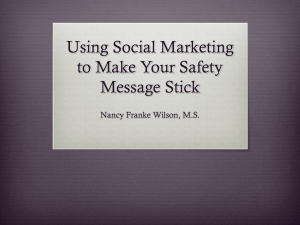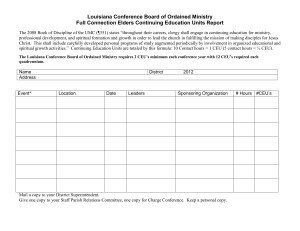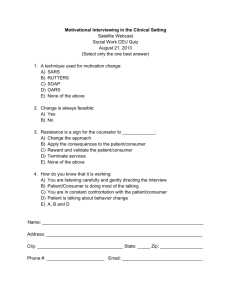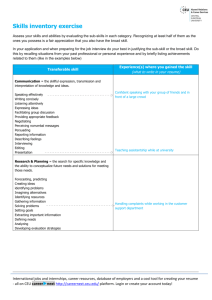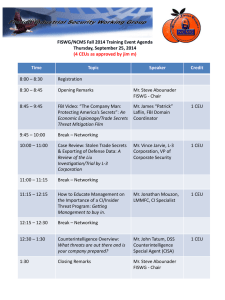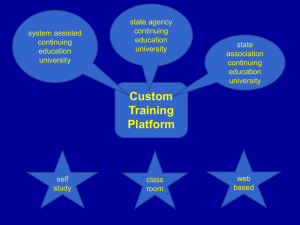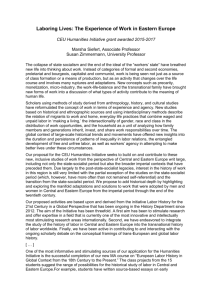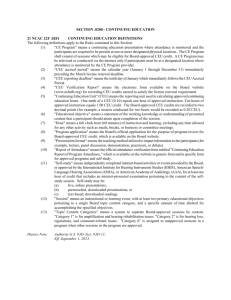Study Guide - Health Education Partners
advertisement
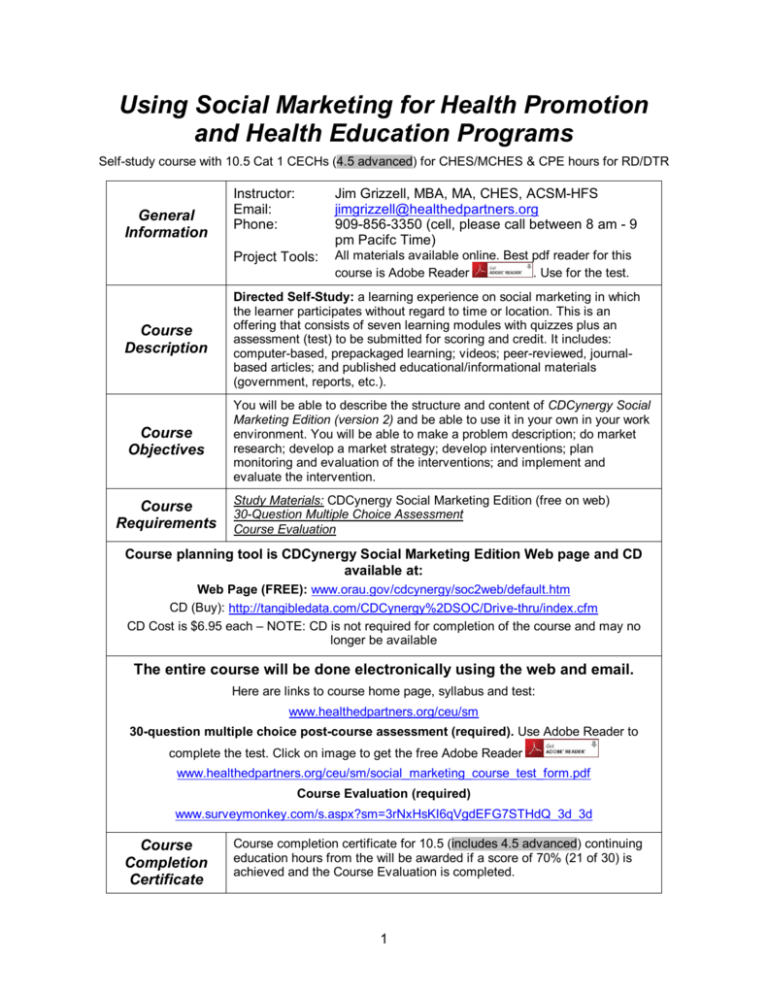
Using Social Marketing for Health Promotion and Health Education Programs Self-study course with 10.5 Cat 1 CECHs (4.5 advanced) for CHES/MCHES & CPE hours for RD/DTR General Information Instructor: Email: Phone: Jim Grizzell, MBA, MA, CHES, ACSM-HFS jimgrizzell@healthedpartners.org 909-856-3350 (cell, please call between 8 am - 9 pm Pacifc Time) Project Tools: All materials available online. Best pdf reader for this course is Adobe Reader . Use for the test. Course Description Directed Self-Study: a learning experience on social marketing in which the learner participates without regard to time or location. This is an offering that consists of seven learning modules with quizzes plus an assessment (test) to be submitted for scoring and credit. It includes: computer-based, prepackaged learning; videos; peer-reviewed, journalbased articles; and published educational/informational materials (government, reports, etc.). Course Objectives You will be able to describe the structure and content of CDCynergy Social Marketing Edition (version 2) and be able to use it in your own in your work environment. You will be able to make a problem description; do market research; develop a market strategy; develop interventions; plan monitoring and evaluation of the interventions; and implement and evaluate the intervention. Course Requirements Study Materials: CDCynergy Social Marketing Edition (free on web) 30-Question Multiple Choice Assessment Course Evaluation Course planning tool is CDCynergy Social Marketing Edition Web page and CD available at: Web Page (FREE): www.orau.gov/cdcynergy/soc2web/default.htm CD (Buy): http://tangibledata.com/CDCynergy%2DSOC/Drive-thru/index.cfm CD Cost is $6.95 each – NOTE: CD is not required for completion of the course and may no longer be available The entire course will be done electronically using the web and email. Here are links to course home page, syllabus and test: www.healthedpartners.org/ceu/sm 30-question multiple choice post-course assessment (required). Use Adobe Reader to complete the test. Click on image to get the free Adobe Reader www.healthedpartners.org/ceu/sm/social_marketing_course_test_form.pdf Course Evaluation (required) www.surveymonkey.com/s.aspx?sm=3rNxHsKI6qVgdEFG7STHdQ_3d_3d Course Completion Certificate Course completion certificate for 10.5 (includes 4.5 advanced) continuing education hours from the will be awarded if a score of 70% (21 of 30) is achieved and the Course Evaluation is completed. 1 Estimated Time ~1 hour Instructions, Activities and Objectives CDCynergy Welcome and Introduction After studying this section the participant will be able to access and use the program and be able to explain concepts of social marketing: Follow detailed start instructions on page 5 to read, and view and listen to the following: • Opening video • Welcome • How to Use Welcome and Menu Approaching the Social Marketing Edition • “Introduction to Social Marketing" Approaching the Social Marketing (Video Segments), History of CDCynergy, Primer for Managers, Is Social Marketing for Your?, Phases and Steps Instructions for remainder of the self-study course 1. Read text for each Step (there are 30 in all) of each of the six Phases 2. View and listen to videos in each step (39 totaling 3.3 hours) 3. Click on icon and read or study “Need More Detail” 4. Click on link, read and study the Examples as provided Example: The Violence Against Women campaign viewed service providers for nonEnglish speaking and Aboriginal males as a key secondary audience. 5. Click on icon and read or study hyperlinked items. These are charts, graphs, definitions, web pages such as CDC Health Protection Goals. 6. Click on icon and correctly answer question at the end of each Step 7. Click on icon and read “Evaluation Relevance” which explains how each step relates to the evaluation process (Phase 5) 2 ~1.5 hour Phase 1: Problem Description After studying the material in this Phase the participant will be able to: • State your health or safety problem and the groups it affects • Identify the major causes of the problem by analyz and identifing factors that foster or hinder learning and skill building • Draft a list of possible audiences for participants program • Learn about previous efforts to address the problem • Form a strategy team by indentifying stakeholder to participate in the assessment process • Identify issues and aspects of participants situation that could affect the program’s success ~1.5 hours Phase 2: Market Research After studying the material in this Phase the participant will be able to: • Spell out participants market research questions • Select research methods to answer those questions • Take full advantage of data that were collected for other purposes • Collect supplementary data • Synthesize and summarize your research results ~2 hours Phase 3: Market Strategy After studying the material in this Phase the participant will be able to: • Select your target audience segment(s) • Define the current and desired behavior for each segment – increasing levels of the desired behavior is their program goal by using assessment results to inform the planning process and develop goal statements • Identifying the benefits of the desired behavior to “doers” in each segment • Clarify the exchange participants will offer and encourage • Assess efficacy of various strategies to ensure consistency with objective by appling a marketing mix analysis to select the intervention’s for their program • Select a variety of strategies and interventions to achieved stated objectives • Write subgoals for each intervention that will add up to their overall program goal ~1.5 hours Phase 4: Interventions After studying the material in this Phase the participant will be able to: • Describe what your services and products will actually look like • Explain how your program will phrase its messages • Explain how your various offerings will be tied together into a cohesive, mutually reinforcing whole • Assemble your planning team and assign roles • Plan your interventions in detail by organizing in a logical sequence and with a timeline for devivery • Test and revise your interventions 3 ~2 hours Phase 5: Monitor Plan After studying the material in this Phase the participant will be able to: • Develop an analysis plan and determine which program components should be monitored and/or evaluated • Create a purpose statement and develop evaluation questions for • Decide how to gather the information • Decide how to analyze and report the data (disseminate findings) • Explain how to get IRB approval for research with human subjects if necessary ~1 hour Phase 6: Implementation After studying the material in this Phase the participant will be able to: • Describe how you will execute intervention plans • Describe initiation of monitoring and evaluation activities (Develop an analysis plan and determine which program components should be monitored and/or evaluated) • Explain how you will modify program components based on feedback • Describe how you will share evaluation findings and lessons learned <1 hour Take the Assessment and Complete the Evaluation (both are required): Use Adobe Reader to open and take the test. It allows you to see your score as you answer questions. Click on the icon or the link below to get the free program. http://www.adobe.com/products/reader.html Assessment is at: www.healthedpartners.org/ceu/sm/social_marketing_course_test_form.pdf Evaluation is at: www.surveymk.com/s.aspx?sm=3rNxHsKI6qVgdEFG7STHdQ_3d_3d Steps for taking the test: 1. Save the test from your browser to your computer or a drive. Remember where it is. Keep for your records and for submission after completing test. 2. Start Adobe Reader 3. Open the Adobe test form with Adobe Reader. NOTE: Be sure you are not using another pdf form reader (test answers may not be visible after saving, the “Submit” button will not work to send the test data) 4. Take the test (scroll to page x to see your score, correct answers if desired) 5. Save the test again to your computer or a drive. 6. Two ways to email or submit your test (depends on email program) a. Attach to email to ce@healthedpartners.org (best if you use gmail, yahoo, live, comcast, or other internet based email programs b. Or “Submit” button only if you use Microsoft Outlook 4 Step 1: Welcome and Introduction Start the course at this link: http://www.orau.gov/cdcynergy/soc2web/default.htm. You will see this web page. Click on Click to Start in the center of the page and view the opening video. Each time you return to continue the self-study course on your own time after viewing the opening video to go to the main menu you only need to click on Skip Intro. Note: if you have problems viewing videos click and follow the Use Computer Settings Guide to prepare your computer. After watching the opening video read text and view/listen to videos linked from each of the headings. These are Welcome, How To Use, Acknowledgements and Introduction to Social Marketing. 5 Steps 2 through 7: Six Phase Tutorial Instructions for remainder of the self-study course Click on CDCynergy Social Marketing Edition 1. Read text for each Step (there are 30 in all) of each of the six Phases 2. View and listen to videos in each step (39 totaling 3.3 hours) 3. Click on icon and read or study “Need More Detail” 4. Click on link, read and study the Examples as provided. There are four examples which are case studies of audience-based program planning Example: The Violence Against Women campaign viewed service providers for nonEnglish speaking and Aboriginal males as a key secondary audience. 5. Click on icon and read or study hyperlinked items. These are charts, graphs, definitions, web pages such as CDC Health Protection Goals. 6. Click on icon and correctly answer question at the end of each Step. There is immediate feedback so you will see the correct answer. Be able to explain the correct answer. 7. Click on icon and read “Evaluation Relevance” which explains how each step relates to the evaluation process (Phase 5) To pass the final test (with at least a score of 70%) you should read the text on each page of each Phase’s Steps. You should view videos and related text in the “Example” sections, read each of the “NEED MORE DETAIL” resources. Each has links in many steps. Answer the “Test Your Knowledge” at the end of each Step throughout the course. 6 Links to Optional PowerPoint Presentations To view the document either press or hold the “Ctrl” button and left click with you mouse button or right click on the link and select “Open” from the menu. Social Marketing National Excellence Collaborative and Social Marketing 101, www.healthedpartners.org/ceu/sm/01_social_marketing_nat_excell_collab_sm101.ppt CDCynergy Social marketing User Training Overview www.healthedpartners.org/ceu/sm/02_social_marketing_cdcynergy_user_training_overview.ppt Is Social Marketing for You? www.healthedpartners.org/ceu/sm/03_is_social_marketing_for_you_v3.ppt Why Let the Devil Play All the Best Tunes – Let’s Use Social Marketing – Presentation to the American College Health Association www.csupomona.edu/~jvgrizzell/socialmarketing/acha2008 Upstream Social Marketing – Presentation to the Wellness and Health Promotion Department of Arizona State University www.csupomona.edu/~jvgrizzell/socialmarketing/acha2008 Additional Course Materials, Resources, Guides, Examples Social Marketing Project Phases and Objectives - (Word) needs assessment, problem description, market research, market strategy, develop cost-effective interventions, prepare for program evaluation and implementation www.healthedpartners.org/ceu/sm/smphasesobjectives.doc CDCynergy's Competitive Advantage - Reason for Using It www.healthedpartners.org/ceu/sm/#Competitive%20Advantage SMART Behavior Change Outcomes Objectives Instructions (PDF) www.healthedpartners.org/ceu/sm/smart_behavior_change_outcome_objectives.pdf Marketing Exposure, Reach and Gross Rating Points (GRP) (PDF) www.healthedpartners.org/ceu/sm/cdcynergy_exposure_reach_grp.pdf Chitlins Case Study "Changing Traditions: Preventing Illness Associated with Chitterlings" Article (PDF) www.healthedpartners.org/ceu/sm/chitlins_original_article.pdf Chitlins Case Study for CDCynergy (PowerPoint) www.healthedpartners.org/ceu/sm/04_chitlins_case_study_walk_thru_for_cdcynergy.ppt Chitlins Case Study MyModel for CDCynergy (PDF) www.healthedpartners.org/ceu/sm/chitterlings_MyModel.pdf 7 Social Marketing Primer for Managers and Supervisors (PDF) www.healthedpartners.org/ceu/sm/social_marketing_primer_managers_supervisors_v2.pdf Theory at a Glance (PDF) - a single, concise summary of health behavior theories that was neither overwhelming nor superficial from the National Cancer Institute (use this 60 page book liberally and, in particular, for Phase 1 Step 4) www.nci.nih.gov/theory MyPlan - (Word) helps you collect information and plan using Phases and Step in CDCynergy - a starter document that contain outlines of a social marketing plan. Contains step by step guidance that will be useful in writing a plan www.healthedpartners.org/ceu/sm/MyPlan.doc MyModel - (Word) a Logic Model that helps you identify target audiences, behaviors to change, exchanges/benefits, strategy and interventions in a concise format. A starter document that contain outlines of a social marketing plan. Contains step by step guidance that will be useful in writing a plan www.healthedpartners.org/ceu/sm/MyModel.doc Sample CHES CECH/CEU Certificate of Completion (PDF) - Participants in online courses must demonstrate participation in the course and successfully complete all assignments and evaluations to receive a certificate of completion. www.healthedpartners.org/ceu/sm/course_completion_certificate_blank.pdf Course Evaluation Form (PDF) but will be done online after completion of course www.healthedpartners.org/ceu/sm/smcoursevaluation.pdf 8
